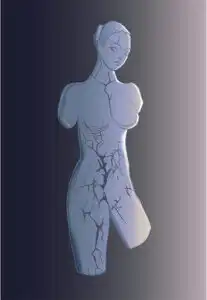Introduction
In the following sonnet, William Shakespeare, one of the most famous writers in history, expresses his thoughts on love. The flow of this sonnet is superb. In this sonnet, the poet aims to demonstrate the potency of rhyming couplets. This sonnet makes use of a number of literary tropes. Some of the literary devices are Alliteration, Allusion, Personification, Repetition, and Epithet. What follows is poetry about the devastating force of nature.

Broken statue
Summary
The following is William Shakespeare’s sonnet number 55. The sonnet has lovely rhythm and structure. The author has made an effort to illustrate the strength and endurance of poems and literature.
The poet claims in the opening verse that his work will outlive the statues and monuments to the wealthy and powerful that he has written. Such folks may believe that by erecting marble tombs and gilded sculptures, they would be granted eternal life, yet time is unreliable. Time is the number one enemy of monuments, and it does not discriminate between the wealthy and the poor in this regard. Eventually, every monument and statue will crumble. The author uses the analogy of a slutty, unfaithful prostitute to depict the passage of time. The author claims that the great monuments that mighty kings erect to their grandeur will eventually be destroyed, either by conflict or the passage of time, so that future generations would never know the majesty of those rulers. The beautiful lyrics about the greatness of those powerful and loving individuals, however, will always make an imprint on one’s spirit that will not be forgotten. The author expresses the hope that poetry will endure since it is appreciated by many. Nothing, not even the god of battle, can wipe the memory of poetry from one’s heart, no matter how mighty the warrior.
The poet continues by saying that it doesn’t matter how strong a monument one constructs; it will eventually be demolished, either in a conflict or with the passage of time, because humans are inherently destructive. The author emphasises once more that a person’s poetry and artistic legacy are the only things that will outlive time and oblivion. People who care for them will remember them fondly, and their legacy will be preserved via poetry. The author dedicates this exquisite sonnet to his companion in this sentence. He claims that the poem and his friend’s memory will outlast all statues and monuments.
The poet continues by saying that even when physical reminders of the person’s life are gone, the person’s legacy will endure in the form of great poetry. For as long as mankind endures, his name will be remembered and his lyrics recited. The poet alludes to Doomsday, the apocalyptic date when mankind is predicted to end.
The poet assures his buddy in the final two lines that they, too, shall be resurrected on the Day of Judgment. For Christians, the end of the world and all of humanity coincide with the day of judgement, or the final day of history. And his friend’s memory will be preserved in people’s minds and souls till the end of time. According to the author, his friend’s memory will go on forever.
This poem exemplifies the transformative potential of art and literature. When people pass away, their achievements and contributions to society are not memorialised with statues or plaques but rather with works of literature.
Textbook Questions and Answers:
Q.1 Why do you think the rich and powerful people get monuments and statues erected in their memory?
Ans: Rich and Powerful people are filled with pride and arrogance and think people will see their glory even after they die. They did not realise that monuments get destroyed by nature and people will not remember them forever.
Q.2 Describe how the monuments and statues brave the ravages of time.
Ans: Monuments and statues remade of stone and cement which are strong and structures constructed with these can stay for centuries. They can withstand extreme weather conditions.
Q.3 Why does the poet refer to Time as being sluttish?
Ans: Time has been referred to as sluttish, by the poet because it doesn’t wait for anyone. It cares for no one and treats everyone the same. Time has no one, it does not care for anyone.
Q.4 The poet says that neither forces of nature nor wars can destroy his poetry. In fact, even the godly powers of Mars will not have a devastating effect on his rhyme. What quality of the poet is revealed through these lines?
Ans: In the following lines, the poet simply wants to say that, Poetry and rhymes are permanent. It will always be alive with humanity. Even God could not destroy the rhymes and powerful and egoistic people can’t understand this.
Not Marble nor the Gilded Monuments Extra Question
Q.1 What does Shakespeare think about poems?
Ans: According to Shakespeare, poems are indestructible and cannot be destroyed by nature like other man made things. Poet thinks that his lyrics are immortal.
Q.2 What is the structure of “Not Marble, nor the Gilded Monuments”?
Ans: “Not Marble, nor the Gilded Monuments” is a sonnet, which is a type of poem consisting of 14 lines. It follows the typical structure of a Shakespearean sonnet, with three quatrains (four-line stanzas) and a final couplet (two-line stanza). The poem is written in iambic pentameter, which means each line has 10 syllables with a pattern of unstressed and stressed syllables.
Q.3: What is the theme of this poem?
Ans: The theme of “Not Marble, nor the Gilded Monuments” is the power of poetry to preserve the memory of people and events. Shakespeare argues that poetry is a more enduring and powerful memorial than any physical monument, no matter how grand or beautiful. The poem also explores the nature of immortality and the inevitability of mortality.
 Mission Statement
Mission Statement
“Empower every student to achieve full potential”
88Guru has been established with the social objective of making quality video-based learning material available to all Indian students. Technology, Connectivity and Social Media are rapidly changing the world of Education and we wish to lead the transformation of the tuition industry in India.
88Guru is the perfect complement to the current tuition model. 88Guru creates a wonderful opportunity for children and parents to bond while engaging in a valuable learning activity. It also provides the complete curriculum at your fingertips for those moments when you need some help at short notice. We believe that this mode of tuition could be transformational, adding hours to a child's day while providing complete control over the learning process.
Every course is taught by the best teachers from India's top schools and conducted in an engaging manner to keep students involved. The e-learning process consists of video-based instructions, computer-graded assignments, and a dashboard which allows the student and parent to track progress.


